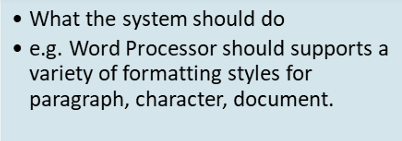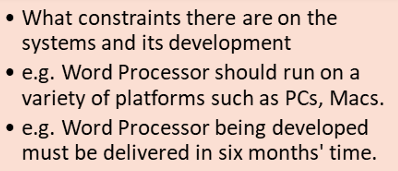ISElective1_CM7
1/30
Earn XP
Description and Tags
ISElective1_CM7
Name | Mastery | Learn | Test | Matching | Spaced | Call with Kai |
|---|
No study sessions yet.
31 Terms
activities progress in a sequential manner
first gather some data, interpret, extract some requirements, process iterates
Imply that requirements exist out there and we simply need to pick them up or catch them.
Gathering and Capturing
Implies that "others" (presumably the clients or users) know the requirements and we have to get them to tell us.
Elicitation
Normally used to describe the activity of investigating and analyzing an initial set of requirements that have been gathered, elicited, or captured.
requirements analysis
recognizes that developing a set of requirements is an iterative process of evolution and negotiation, and one that needs to be carefully managed and controlled.
Requirements Engineering
Statement about an intended product that specifies what it should do or how it should perform.
requirement

Different Kinds of Requirements:
Different Kinds of Requirements (Traditional): Functional Requirement

Different Kinds of Requirements:
Different Kinds of Requirements (Traditional): Non-Functional Requirement
Different Kinds of Requirements: Capture what the product should do
Different Kinds of Requirements (Interaction Design): Functional Requirements
Different Kinds of Requirements: Capture the type, volatility, size/amount, persistence, accuracy, and value of the amounts of the required data
Different Kinds of Requirements (Interaction Design): Data Requirements
Different Kinds of Requirements: Refer to the circumstances in which the interactive product will be expected to operate
Different Kinds of Requirements (Interaction Design): Data Requirements
Environmental Requirements: dusty? noisy? vibration? light? heat? humidity?
Environmental Requirements: Physical Environment
Environmental Requirements: sharing of files, of displays, in paper, across great distances, work individually, privacy for clients
Environmental Requirements: Social Environment
Environmental Requirements: user support, facilities or resources for training, stability of communication infrastructure, hierarchy in the management;
Environmental Requirements: Organizational Environment
Environmental Requirements: what technologies will the product run on, compatibility, and technological limitations
Environmental Requirements: Technical Environment
Capture the characteristics and attributes (User Profile) of the intended user group
A user may be a novice (needs step-by-step, constrained and clear information), an expert (flexibilty, access/power), a casual (clear instructions), or a frequent user (shorcuts)
Different Kinds of Requirements (Interaction Design): User Requirements
Capture the usability goals and associated measures for a particular product
effectiveness, efficiency, safety, utility, learnability, and memorability
Different Kinds of Requirements (Interaction Design): Usability Requirements
important part of the requirements activity and also of evaluation
Data gathering
6 Data gathering techniques
questionnaires, interviews, focus groups and workshops, naturalistic observation, and studying documentation.
• A series of questions designed to elicit specific information
• Questions may require different kinds of answers: (1) simple YES/NO, (2) choice of pre-supplied answer, (3) comment
• are sent in electronic form and arrive via email or are posted on a website, and sometimes they are given on paper
• In most cases the questionnaire is administered at a distance
• Good for answering specific questions from a large, dispersed group of people
Data gathering techniques: Questionnaires
• involve asking someone a set of questions
• often conducted face-to-face but not necessary, may also be in telephone interview
• can be structured, unstructured or semi-structured
• are good at getting people to explore issues
• time consuming and it may not be feasible to interview all the people
Data gathering techniques: Interview
are good at gaining a consensus view and/or highlighting areas of conflict and disagreement
Data gathering techniques: Groups and Workshops
• involves spending some time with the stakeholders as they go about their day-to-day tasks, observing work as it happens, in its natural setting
• A member of the design team shadows a stakeholder, making notes, asking questions (but not too many), and observing what is being done in the natural context of the activity
• Requires time and commitment from a member of the design team, and it can result in a huge amount of data
Data gathering techniques: Naturalistic Observation
Procedures and rules are often written down in manuals and these are a good source of data about the steps involved in an activity and any regulations governing a task
Data gathering techniques: Studying Documentation
suggest that choosing between data-gathering techniques rests on two issues: the nature of the data gathering technique itself and the task to be studied.
Olson and Moran (1996)
Data gathering techniques differ in two ways:
Amount of time, level of detail and risk associated with the findings
Knowledge the analyst requires
an "informal narrative description" (Carroll, 2000). It describes human activities or tasks in a story that allows exploration and discussion of contexts, needs, and requirements. It does not explicitly describe the use of software or other technological support to achieve a task.
scenario
emphasizes on a user-system interaction rather than the user's task itself. A ______ is associated with an actor, and it is the actor's goal in using the system that the use case wants to capture.
Use cases
represent abstractions from scenarios, i.e., they represent a more general case than a scenario embodies, and try to avoid the assumptions of a traditional use case.
structured narrative consisting of three parts: a name that expresses the overall user intention, a stepped description of user actions, and a stepped description of system responsibility.
Essential use cases
used mainly to investigate an existing situation, to envision new systems or devices. It is used to analyze the underlying rationale and purpose of what people are doing: what are they trying to achieve, why are they trying to achieve it, and how are they going about it.
Task analysis
originally designed to identify training needs (Annett and Duncan, 1967). It involves breaking a task down into subtasks and then into sub-subtasks and so on. These are then grouped together as plans that specify how the tasks might be performed in an actual situation.
Hierarchical Task Analysis (HTA)